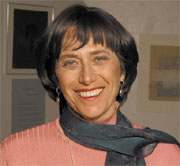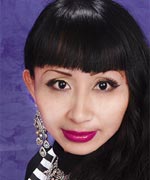|
|
 |
 |

Vera Schwarcz
薇拉-施娃茨
  Born in Romania, Vera Schwarcz is a China historian and poet. She earned her BA from Vassar, MA from Yale and PH.D from Stanford. The author of eight books on Chinese and Jewish history including the prize-winning Bridge Across Broken Time: Chinese and Jewish Cultural Memory; The Chinese Enlightenment: Intellectuals and the Legacy of the May Fourth Movement of 1919; Time for Telling Truth is Running Out: Conversations with Zhang Shenfu; Place and Memory in Singing Crane Garden and most recently: Colors of Veracity: A quest for truth in China, and beyond (Hawaii University Press, 2014). She has also written five books of poetry, among them: In the Garden of Memory (with paper art by Holocaust survivor Chava Pressburger), Brief Rest in the Garden of Flourishing Grace; Chisel of Remembrance. Her most recent collection of poems is entitled Ancestral Intelligence: Renditions and Poems (Antrim Press, 2013). Schwarcz holds the Freeman Chair in East Asian Studies at Wesleyan University in CT. Her work won a Guggenheim Fellowship and is featured on the web @: between2walls.com. Born in Romania, Vera Schwarcz is a China historian and poet. She earned her BA from Vassar, MA from Yale and PH.D from Stanford. The author of eight books on Chinese and Jewish history including the prize-winning Bridge Across Broken Time: Chinese and Jewish Cultural Memory; The Chinese Enlightenment: Intellectuals and the Legacy of the May Fourth Movement of 1919; Time for Telling Truth is Running Out: Conversations with Zhang Shenfu; Place and Memory in Singing Crane Garden and most recently: Colors of Veracity: A quest for truth in China, and beyond (Hawaii University Press, 2014). She has also written five books of poetry, among them: In the Garden of Memory (with paper art by Holocaust survivor Chava Pressburger), Brief Rest in the Garden of Flourishing Grace; Chisel of Remembrance. Her most recent collection of poems is entitled Ancestral Intelligence: Renditions and Poems (Antrim Press, 2013). Schwarcz holds the Freeman Chair in East Asian Studies at Wesleyan University in CT. Her work won a Guggenheim Fellowship and is featured on the web @: between2walls.com.
薇拉-施娃茨的中文名为舒衡哲, 生于罗马尼亚, 犹太人, 现任教于美国康州威斯理安大学, 并从事中国现代史研究。1980 年曾作为首批美国留学生在北京大学中文系学习。她曾出版过8部历史研究书籍和5部诗集,曾获古根汉姆奖等多种奖项。
|

|

译者
Translator
谢茜
Xie Qian
 
谢茜生于一九七五年,籍贯四川。1994年考入北京大学信息管理系,2001年进入北京矿业大学研究生院英语系英语语言文学专业学习。爱好写作,弹钢琴,拉小提琴等。现在美国从事汉语教学,居住于密歇根州。她的第一本诗集《花痕》由长江文艺出版社出版。
Xie Qian was born in 1975 in the Sichuang Province. She studied at the Information Management Department of Beijing University and the English Language and Literature Department of the graduate school of the China University of Mining and Technology in Beijing. She enjoys writing, playing piano and painting. She is teaching the Chinese language in Michigan. Her first book of poetry entitled The Traces of Flowers was published by Changjiang Literature and Arts Publishing House in China.
|
 |
An Ampler Alphabet for Life |
 |
一个更充裕的生命字母 |
Until this week, I had not bothered
with the heart of all living beings,
never thought about the four letters,
two pairs that code us all:
you and I, like mice and E. coli
depend on wedding
G to C, A to T.
Then one playful biologist
(alas not you since time
was cruelly short) snagged
DNA's copying machine—
polymerase, an enzyme
you marveled at, has added
an X-Y pair (faint echo
of our broken woman-
man coupling).
For now, this pair thrives
in test tubes only, beckons
with the promise of saying more
than possible with the old
alphabet for stammering loss.
|
|
直至这个星期,我从未费神
思量过人类的来源
从未思量过这四个字母
将我们一切人皆改为代码的两对字母:
你和我,鼠和大肠杆菌
皆依赖G与C,A与T的结合
之后,一个戏谑的生物学家
(啊,不是你,因时间是如此残酷地短瞬)
抓起了DNA的拷贝机器
令你讶异的聚合酶,酶的一种
增加了一对性染色体
(我们断裂的男女连结的虚弱的回音)
自此,这对染色体仅于试管里
旺盛着,以知无不言的承诺,用古旧的字母,
呼唤,吞吞吐吐的遗失。
|
 |
February Mind |
 |
二月的心思 |
Rootless trees scratch winter's sky,
men's feet amble across icicles
lunging from a library window.
Here is the wonder of it all:
Unpierced, their heads undulate
along snow-squeezed paths
reflecting ripples inside
February's mind.
|
|
无根的树木刮擦着冬日的天空
人们的脚,徐行过冰锥
它们自图书馆的窗棂,悬垂下来
这便是最奇妙的地方:
未被刺穿,他们的头,
沿着因积雪逼仄的小径起伏。
在二月的心思里,照出涟漪。
|
 |
Physics of Wrinkle Formation |
 |
皱纹形成的物理学 |
We could have grown older
together. But no complaints.
We had already mastered
the physics of wrinkle formation,
skin thinning, folding, crumpling
in a chiral pattern, breaking
symmetries and illusions of youth.
We had, unknowingly, mimicked
the mimosa, learned to curl
upward at the lightest touch.
If only the hydration of tears
could revive withered leaves,
unwrinkle worried brows
unbuckle the weak diagonals
along which our days were severed,
then a new physics would take root:
You'd wake again and we'd buy
a mail-order house complete
with sofas, books, bird feeder.
We follow simple instructions:
Compress to unfold.
|
|
我们本可以一起老去的,然没有怨言。
以一种手性的模式,我们已经掌握了皱纹形成、
皮肤变薄、皱缩的物理学,
打破了青春的匀称与幻影。
我们已经,无意间,模仿了含羞草,
对最轻微的触摸,也学会卷合起来了。
如果眼泪的水合作用,
能让凋萎的树叶焕然,
能把虚弱对角线的带扣解开,
我们的日子沿着那些对角线被切割。
之后,一个新的物理学将生根。
你会再度醒来,我们已买了一座邮购的房子,
有沙发,书,和鸟雀喂食器。
我们依循简单的指南,
压缩到展开
|
 |
|
|







